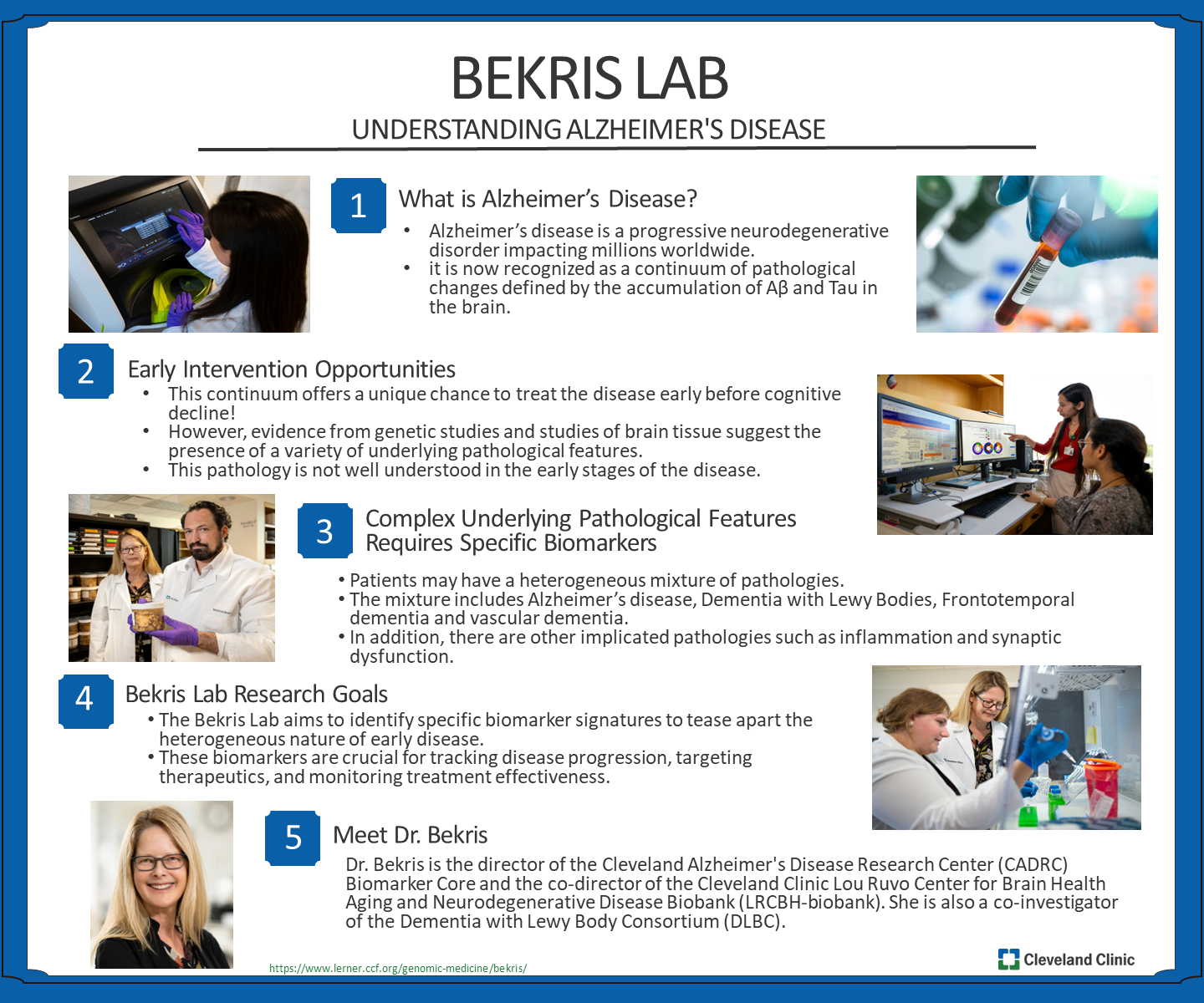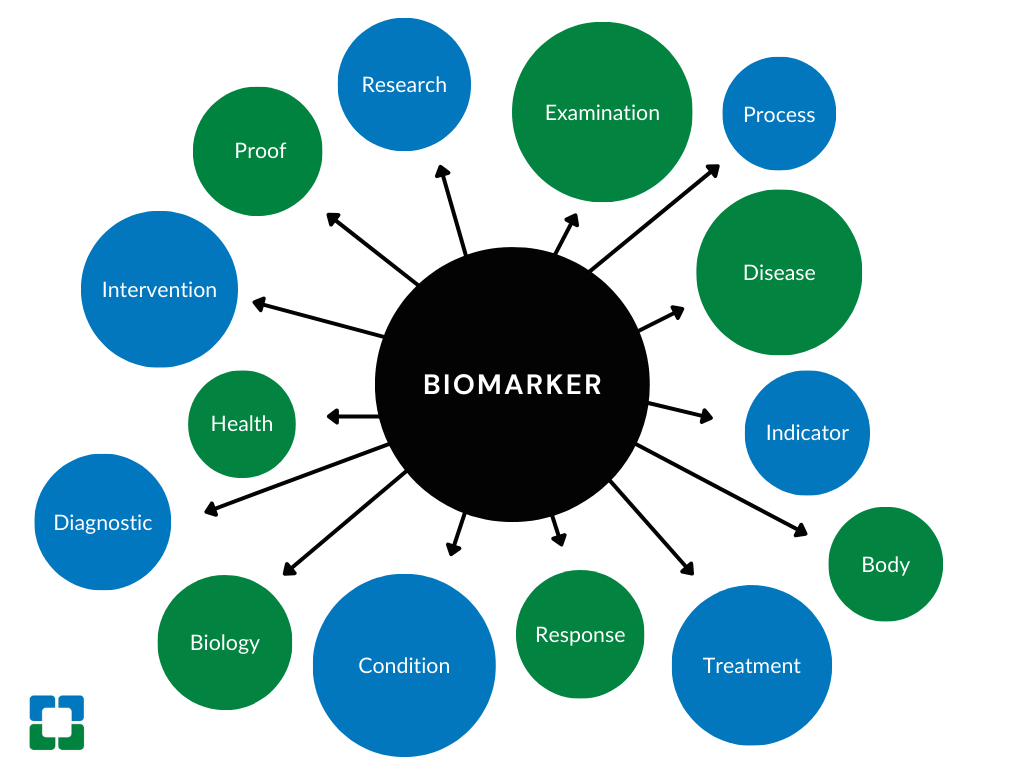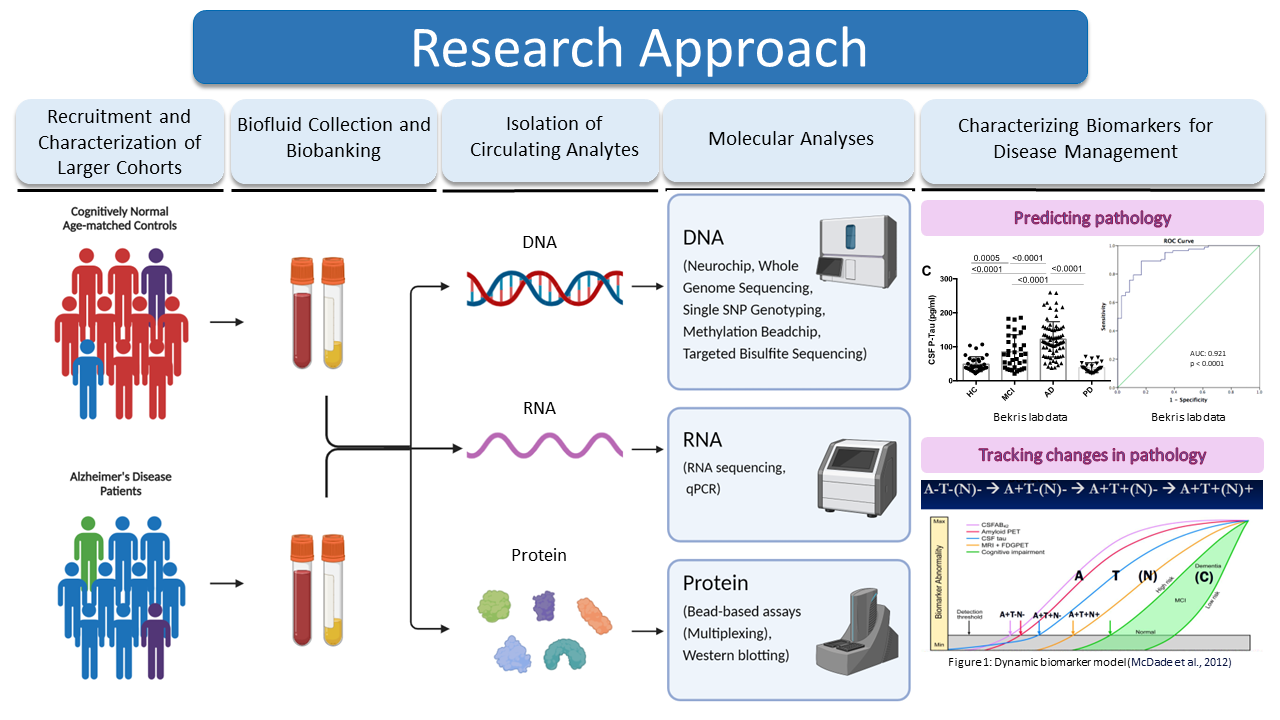Lynn Bekris Laboratory
-
Lynn Bekris Laboratory
- Principal Investigator
- Research
- Our Team
- Publications
- Careers
- Research News
Research
Bekris lab is focused on Alzheimer's Disease Biomarker Discovery and uses clinical and experimental approaches to demonstrate the feasibility of circulating factors in human biofluids, such as genetic, epigenetic, or proteins, as either potential early stage drug targets or early biomarkers of disease risk, progression or therapeutic outcomes.
Biography
Lynn Bekris, PhD, is the principal investigator of the Bekris Lab. Her education and training took place at the University of Washington in Seattle, where she was introduced to the concept of biomarkers as a means to diagnose disease while conducting research in a Type I diabetes lab. Since then, she has investigated how genetic variation or variation of circulating proteins can help us understand and monitor the progression of neurodegenerative diseases, such as Alzheimer’s disease.
Education & Professional Highlights
Research
Overview
The Bekris lab focuses on identifying specific biomarker signatures that tease apart the heterogeneous nature of early pre-symptomatic disease for:
1. Biomarker characterization
2. Tracking disease progression
3. Monitoring treatment effectiveness

Pictured: Infographic of the Bekris Lab's introduction to understanding Alzheimer's disease

Pictured: Biomarker Mind Map

Pictured: Bekris Lab Research Approach Diagram
In the Media
2024 LTA Member for the Year Award
- Venue: Lerner Trainee Newsletter
- https://www.lerner.ccf.org/education/documents/Aug2024NewsletterFinalCompressed.pdf
- Release Date: 8/01/24
- Topic: Recognizing LTA members for their contributions to the mission and the success of their subcommittees and LTA.
Blood-based Biomarkers for Alzheimer’s Disease in Women
- Venue: Cleveland Clinic Neuro Pathways Podcast
- https://consultqd.clevelandclinic.org/blood-based-biomarkers-for-alzheimers-disease-in-women-podcast/
- Release Date: 11/01/23
- Topic: A research project aims to pinpoint biomarkers that could speed diagnosis
Changes in the Diagnostic Process of Alzheimer Disease: A New Era of Blood-Based Approaches.
- Venue: Neurology Live
- https://www.neurologylive.com/view/changes-diagnostic-process-alzheimer-disease-new-era-blood-based-approaches
- Release Date: 12/08/23
- Topic: The diagnostic value of biofluid biomarkers of Alzheimer's Disease.
Our Team
Selected Publications
View publications for Lynn Bekris, PhD
(Disclaimer: This search is powered by PubMed, a service of the U.S. National Library of Medicine. PubMed is a third-party website with no affiliation with Cleveland Clinic.)
- A Computational Approach in the Systematic Search of the Interaction Partners of Alternatively Spliced TREM2 Isoforms Junyi Liang, Aditya Menon, Taylor Tomco, Nisha Bhattarai, Iris Nira Smith, Maria Khrestian, Shane V Formica, Charis Eng, Matthias Buck, Bekris LM. Int J Mol Sci 2024
- ATN cerebrospinal fluid biomarkers in dementia with Lewy bodies: Initial results from the United States Dementia with Lewy Bodies Consortium. Jain L, Khrestian M, Formica S, Tuason ED, Pillai JA, Rao S, Oguh O, Lippa CF, Lopez OL, Berman SB, Tsuang DW, Zabetian CP, Irwin DJ, Galasko DR, Litvan I, Marder KS, Honig LS, Fleisher JE, Galvin JE, Bozoki AC, Taylor AS, Sabbagh MN, Leverenz JB, Bekris LM. Alzheimers Dement. 2023
- Peripheral sTREM2-Related Inflammatory Activity Alterations in Early-Stage Alzheimer's Disease. Weber GE, Khrestian M, Tuason ED, Shao Y, Pillai J, Rao S, Feng H, Zhou Y, Cheng F, DeSilva TM, Stauffer S, Leverenz JB, Bekris LM. J Immunol. 2022
- Temporal Ordering of Inflammatory Analytes sTNFR2 and sTREM2 in Relation to Alzheimer's Disease Biomarkers and Clinical Outcomes. Pillai JA, Khrestian M, Bena J, Leverenz JB, Bekris LM. Front Aging Neurosci. 2021
- TNFRSF1B Gene Variants and Related Soluble TNFR2 Levels Impact Resilience in Alzheimer's Disease. Pillai JA, Bebek G, Khrestian M, Bena J, Bergmann CC, Bush WS, Leverenz JB, Bekris LM. Front Aging Neurosci. 2021
- TREM2 alters the phagocytic, apoptotic and inflammatory response to Aβ42 in HMC3 cells. Akhter R, Shao Y, Formica S, Khrestian M, Bekris LM.Mol Immunol. 2021
- TNFRSF1B Gene Variants and Related Soluble TNFR2 Levels Impact Resilience in Alzheimer's Disease. Pillai JA, Bebek G, Khrestian M, Bena J, Bergmann CC, Bush WS, Leverenz JB, Bekris LM.Front Aging Neurosci. 2021.
- An Altered Relationship between Soluble TREM2 and Inflammatory Markers in Young Adults with Down Syndrome: A Preliminary Report. Weber GE, Koenig KA, Khrestian M, Shao Y, Tuason ED, Gramm M, Lal D, Leverenz JB, Bekris LM. J Immunol. 2020.
- Key inflammatory pathway activations in the MCI stage of Alzheimer's disease. Pillai JA, Maxwell S, Bena J, Bekris LM, Rao SM, Chance M, Lamb BT, Leverenz JB; Alzheimer’s Disease Neuroimaging Initiative. Ann Clin Transl Neurol. 2019.
- Soluble TREM2 and biomarkers of central and peripheral inflammation in neurodegenerative disease. Bekris LM, Khrestian M, Dyne E, Shao Y, Pillai JA, Rao SM, Bemiller SM, Lamb B, Fernandez HH, Leverenz JB. J Neuroimmunol. 2018.
- DNA methylation of TOMM40-APOE-APOC2 in Alzheimer's disease. Shao Y, Shaw M, Todd K, Khrestian M, D'Aleo G, Barnard PJ, Zahratka J, Pillai J, Yu CE, Keene CD, Leverenz JB, Bekris LM. J Hum Genet. 2018.
- Epigenetic signature and enhancer activity of the human APOE gene. Yu CE, Cudaback E, Foraker J, Thomson Z, Leong L, Lutz F, Gill JA, Saxton A, Kraemer B, Navas P, Keene CD, Montine T, Bekris LM. Hum Mol Genet. 2013
Careers
Training at Lerner Research Institute
Our education and training programs offer hands-on experience at one of the nationʼs top hospitals. Travel, publish in high impact journals and collaborate with investigators to solve real-world biomedical research questions.
Learn MoreResearch News

Dr. Bekris’ team found that patterns of sTREM2-related inflammatory activity were specific to Alzheimer’s disease stages.

With a new $4 million grant, Drs. Cheng, Bekris and Leverenz will develop and utilize artificial intelligence tools to identify novel drug targets and repurposable drugs for Alzheimer’s disease.

The multi-institution collaboration, which includes Dr. Bekris’ team, aims to accelerate research for Alzheimer’s disease and related dementias.

Dr. Bekris’ team has found that Alzheimer’s disease resilience may be modulated by interactions between a TNFRSF1B gene variant and the protein sTNFR2.

Dr. Bekris’s team will study the protein TREM2 as a biomarker of inflammation in pre-symptomatic and early symptomatic stages of Alzheimer’s disease.
